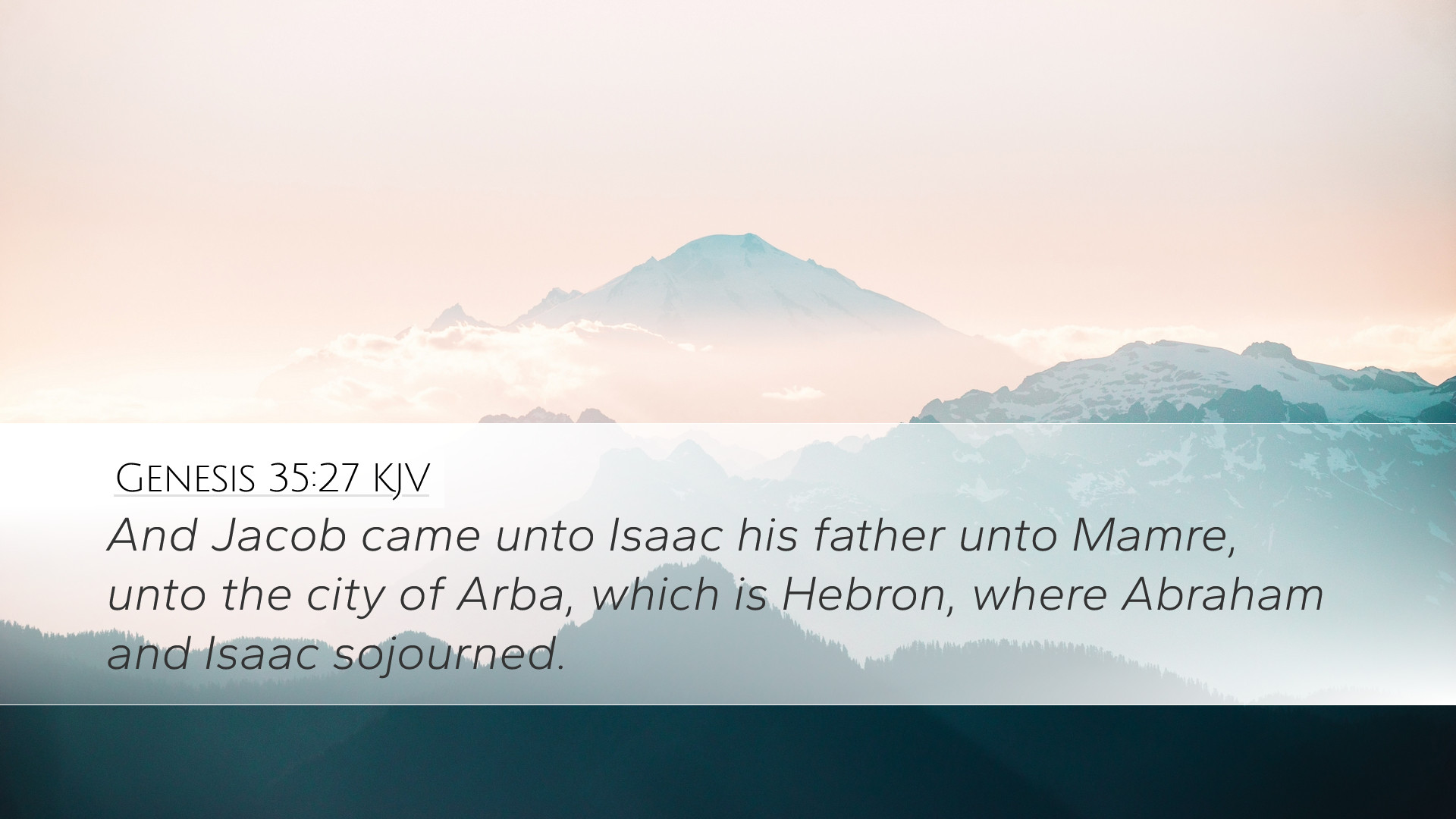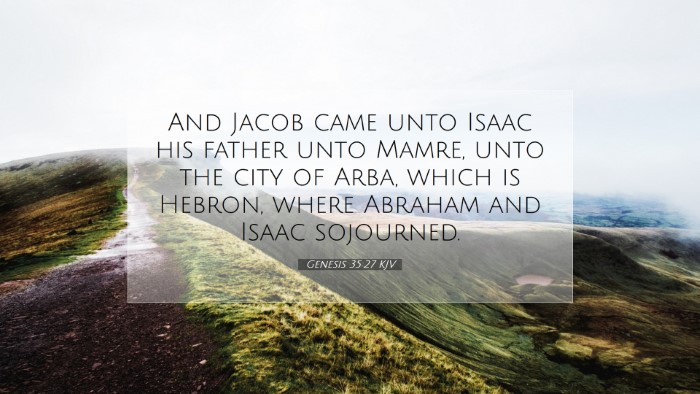Commentary on Genesis 35:27
Verse: “And Jacob came unto Isaac his father unto Mamre, unto the city of Arbah, which is Hebron, where Abraham and Isaac sojourned.”
Contextual Overview
Genesis 35:27 marks a significant moment in the narrative of Jacob's life, illustrating themes of family reunion, pilgrimage, and the fulfillment of God's promises. The passage connects Jacob to his heritage as he returns to his father Isaac. This moment is not merely geographical but carries rich theological implications.
Insights from Public Domain Commentaries
Matthew Henry
Matthew Henry emphasizes the importance of this return to Hebron, which was a place of great patriarchal significance. It not only signifies a return to his father's household but also symbolizes Jacob's restoration of familial ties. Henry notes that Jacob's pilgrimage to Hebron serves as a reminder of God's faithfulness throughout the generations, urging believers to remember their own heritage and the promises given to their forefathers.
- The Significance of Mamre: Henry points out that Mamre was a notable site in the biblical narrative where Abraham dwelled. The return to this location by Jacob can be seen as a return to spiritual roots, reflecting on the promises made to Abraham regarding the land and progeny.
- Familial Restoration: The verse signifies a pivotal moment in Jacob's life, marking a reunion not only with Isaac but symbolically with his past and the covenant God made with Abraham and Isaac.
Albert Barnes
Albert Barnes provides an in-depth analysis of the geographical and historical context of this verse. He identifies Hebron (Arbah) as a vital city with rich connections to the patriarchs. Barnes highlights the themes of divine promise and the continuity of God's covenant from Abraham to Isaac and now to Jacob.
- Covenantal Significance: Barnes comments on the importance of covenant continuity as Jacob returns to a land promised to Abraham. This movement is not just physical but represents Jacob's role in the unfolding of God's plan for His chosen people.
- Jacob’s Transition: Returning to his father Isaac signifies a crucial transition for Jacob as he moves from a life of struggle and deception to one where he must embrace his identity as a patriarch. This aspect is vital for understanding the biblical characterization of Jacob.
Adam Clarke
Adam Clarke’s commentary offers additional insights into the implications of Jacob’s return. He suggests that this journey back to Hebron represents not only a physical return but a return to a place of divine instruction and familial foundations. Clarke notes the theological importance of Jacob's life experiences leading to this moment of reunion.
- Reflecting on Past Experiences: Clarke urges readers to reflect on Jacob’s tumultuous past, noting how his experiences shape the individual he becomes upon returning to Isaac. This serves as a powerful lesson on the importance of divine guidance throughout life’s journey.
- Divine Providence: Clarke emphasizes God’s providence in orchestrating events that lead Jacob back home. This theme reminds believers of God’s ongoing involvement in their lives and affirms the belief in a God who directs and guides.
Theological Implications
The return of Jacob to Isaac contains profound theological implications for understanding the narrative arc of Genesis. The act of going home is laden with symbolic meanings reflecting reconciliation, inheritance, and the continuity of faith.
- Reconciliation: This passage serves as a lens through which we can understand the broader theme of reconciliation with God and with family. Just as Jacob returns to Isaac, believers are reminded of their need to restore relationships and seek peace.
- God's Faithfulness: Jacob's journey underscores the unwavering faithfulness of God. Each step taken by Jacob is a step towards fulfilling God's promises. The narrative of Genesis encourages us to trust in God's timing and plan.
- Legacy: Jacob's return emphasizes the importance of legacy and the passing on of faith. The generation of Abraham, Isaac, and now Jacob illustrates the progression of God's work through families and communities.
Conclusion
In examining Genesis 35:27 through the lenses of Matthew Henry, Albert Barnes, and Adam Clarke, we find a rich tapestry of meaning that speaks to the lives of pastors, theologians, and students of Scripture. Jacob’s return signifies more than a physical journey; it is representative of God’s covenant faithfulness and the imperative of reconciliation within the family of faith. The implications of this verse encourage all believers to reflect on their own journeys towards restoration, community, and divine purpose.


